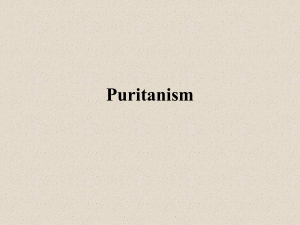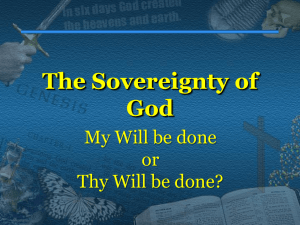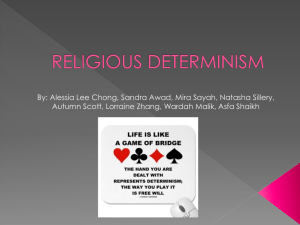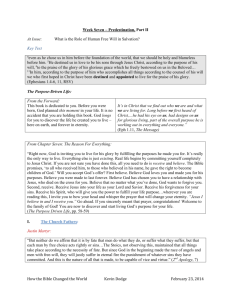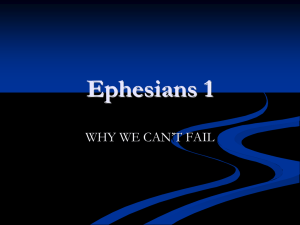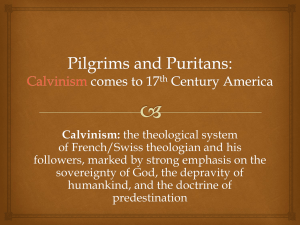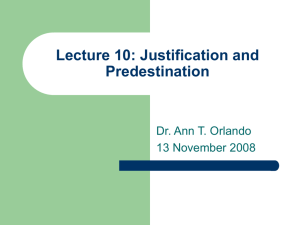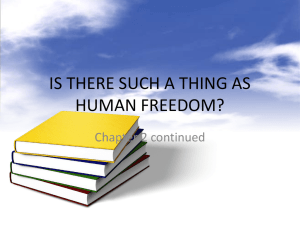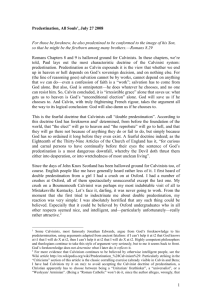Week Six – Predestination (Part I) At Issue: Is There Free Will or not
advertisement
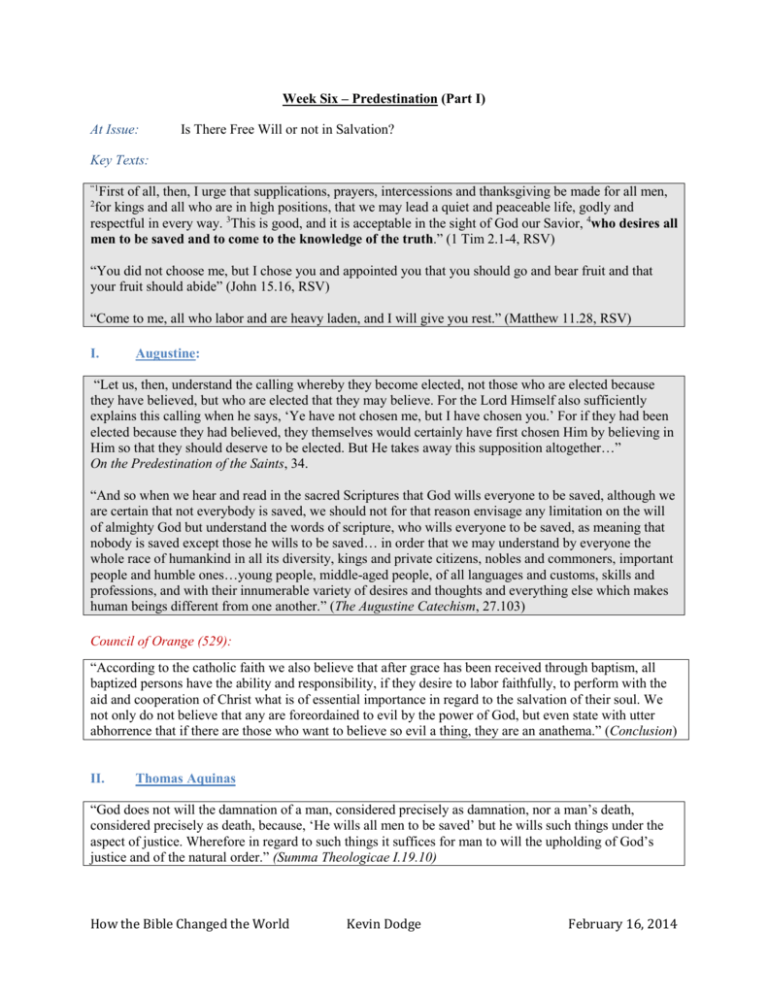
Week Six – Predestination (Part I) At Issue: Is There Free Will or not in Salvation? Key Texts: “1 First of all, then, I urge that supplications, prayers, intercessions and thanksgiving be made for all men, for kings and all who are in high positions, that we may lead a quiet and peaceable life, godly and respectful in every way. 3This is good, and it is acceptable in the sight of God our Savior, 4who desires all men to be saved and to come to the knowledge of the truth.” (1 Tim 2.1-4, RSV) 2 “You did not choose me, but I chose you and appointed you that you should go and bear fruit and that your fruit should abide” (John 15.16, RSV) “Come to me, all who labor and are heavy laden, and I will give you rest.” (Matthew 11.28, RSV) I. Augustine: “Let us, then, understand the calling whereby they become elected, not those who are elected because they have believed, but who are elected that they may believe. For the Lord Himself also sufficiently explains this calling when he says, ‘Ye have not chosen me, but I have chosen you.’ For if they had been elected because they had believed, they themselves would certainly have first chosen Him by believing in Him so that they should deserve to be elected. But He takes away this supposition altogether…” On the Predestination of the Saints, 34. “And so when we hear and read in the sacred Scriptures that God wills everyone to be saved, although we are certain that not everybody is saved, we should not for that reason envisage any limitation on the will of almighty God but understand the words of scripture, who wills everyone to be saved, as meaning that nobody is saved except those he wills to be saved… in order that we may understand by everyone the whole race of humankind in all its diversity, kings and private citizens, nobles and commoners, important people and humble ones…young people, middle-aged people, of all languages and customs, skills and professions, and with their innumerable variety of desires and thoughts and everything else which makes human beings different from one another.” (The Augustine Catechism, 27.103) Council of Orange (529): “According to the catholic faith we also believe that after grace has been received through baptism, all baptized persons have the ability and responsibility, if they desire to labor faithfully, to perform with the aid and cooperation of Christ what is of essential importance in regard to the salvation of their soul. We not only do not believe that any are foreordained to evil by the power of God, but even state with utter abhorrence that if there are those who want to believe so evil a thing, they are an anathema.” (Conclusion) II. Thomas Aquinas “God does not will the damnation of a man, considered precisely as damnation, nor a man’s death, considered precisely as death, because, ‘He wills all men to be saved’ but he wills such things under the aspect of justice. Wherefore in regard to such things it suffices for man to will the upholding of God’s justice and of the natural order.” (Summa Theologicae I.19.10) How the Bible Changed the World Kevin Dodge February 16, 2014 Catechism of the Catholic Church “To God, all moments of time are present in their immediacy. When therefore he establishes his eternal plan of ‘predestination,’ he includes in it each person’s free response to grace.” (Catechism, 600) III. John Calvin “By predestination we mean the eternal decree of God, by which he determined with himself whatever he wished to happen with regard to every man. All are not created on equal terms, but some are preordained to eternal life, others to eternal damnation; and, accordingly, as each has been created for one or other of these ends, we say that he has been predestinated to life or to death.” (Institutes 3.21.5) IV. Westminster Confession “Those of mankind that are predestined unto life, God, before the foundation of the world was laid, according to His eternal and immutable purpose, and the secret counsel and good pleasure of His will, has chosen, in Christ, unto everlasting glory, out of His mere free grace and love, without any foresight of faith, or good works, or perseverance in either of them, or any other thing in the creature, as conditions, or causes moving Him thereunto; and all to the praise of his glorious grace… …The rest of mankind God was pleased, according to the unsearchable counsel of His own will, whereby He extends or withholds mercy, as He pleases, for the glory of His sovereign power over His creatures, to pass by; and to ordain them to dishonor and wrath for their sin, to the praise of His glorious justice.” (Westminster Confession III.5, 7) For Further Reading: Aquinas, Thomas. Summa Theologicae. Volume Three. Notre Dame: Christian Classics, 1981. Augustine. Answer to the Pelagians. Series I. Volume 23. Works of Saint Augustine. Hyde Park, NY: New City Press, 1997. McGrath, Alister. Iustitia Dei: A History of the Christian Doctrine of Justification. Third Edition. Cambridge: Cambridge University Press, 2005. Most, William. Grace, Predestination and the Salvific Will of God: New Answers to Old Questions. Fort Royal, VA: Christendom Press, 2004. Salza, John. The Mystery of Predestination. Charlotte: TAN Books, 2010. Schaff, Peter, Ed. “The Canons of the Council of Orange.” in Nicene and Post-Nicene Fathers. Series II. Volume 14. Peabody, MA: Hendrickson Publishers, 1999. TeSelle, Eugene. Augustine the Theologian. Eugene, OR: Wipf & Stock Publishers, 1970. Thuesen, Peter. Predestination: The American Career of a Contentious Doctrine. Oxford: Oxford University Press, 2009. How the Bible Changed the World Kevin Dodge February 16, 2014
